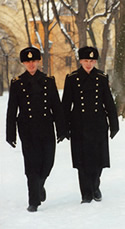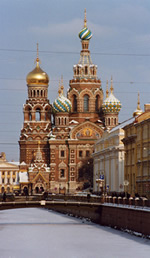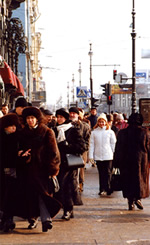We
knew it'd be trouble when we picked up our electric-blue Seat at the AVIS car
rental in downtown Tallinn. The car glistened in the Estonian winter sun, casting
a bluish shadow on bystanders. Wary, we asked if they had something a little less
conspicuous, like a rust-covered Lada. No luck. It was either glow-in-the-dark
Seat or no car at all. AVIS, we had found out through many phone calls, was the
only rental company that allowed customers to drive its cars over the border to
Russia. We needed to get to St. Petersburg; it was too late to catch the train.
Elena and I threw in our bags and headed for the highway.
 After
a pretty uneventful drive to the border, the fun
started in the Estonian border town of Narva. To
cross the border, we were told, we had to pay a
newly instated border-crossing tax. That had to
be done at a booth inside a gated industrial area
at the other side of town. But first we had to pick
up the ticket to pay the tax. Of course the two
people who work in the booth where you pick up the
ticket to pay for the tax can't take your money.
That has to be done by two people in another booth,
who can't issue the tax receipt. That has to be
done by two people at a third window. And the two
people who issue the receipt can't open the gate
so you can get out. That has to be done by a guy
who just happens to be on his break. And they still
manage to have an unemployment rate of 18 per cent
in this town. Don't ask me how.
After
a pretty uneventful drive to the border, the fun
started in the Estonian border town of Narva. To
cross the border, we were told, we had to pay a
newly instated border-crossing tax. That had to
be done at a booth inside a gated industrial area
at the other side of town. But first we had to pick
up the ticket to pay the tax. Of course the two
people who work in the booth where you pick up the
ticket to pay for the tax can't take your money.
That has to be done by two people in another booth,
who can't issue the tax receipt. That has to be
done by two people at a third window. And the two
people who issue the receipt can't open the gate
so you can get out. That has to be done by a guy
who just happens to be on his break. And they still
manage to have an unemployment rate of 18 per cent
in this town. Don't ask me how.
 |
Young soldiers in Admiratelsky Park, St. Petersburg |
Then
followed a thorough two-hour inspection at the border of us, our papers and our
car. The thermometer hit minus five Fahrenheit that day and our teeth chattered
as we answered the border guards' questions. Vacation in Russia in February? Now,
what were we really going to do there? After a good hour of interrogation, they
went on to inspect the car. That's when we found out that the lock to the trunk
of the car that frozen solid in the cold. Very suspicious. Slowly they started
to take the car apart, cushion by cushion.
A
kilometer or two into the Russian side we had our first, of what would be countless,
encounter with the Russian traffic police. We were speeding. 83 kilometers an
hour. Speed limit was 60. Pretty sure we had not been speeding, but still a little
afraid to argue with a Russian officer, we paid up. We haggled the fine down to
ten percent of the initial asking price and paid, in dollars. When I politely
asked for a receipt in very broken Russian, we got what looked like a couple of
movie stubs. Maybe the stubs said speeding ticket; maybe they said 'one free popcorn'.
I couldn't say.
Another
kilometer or so down the road we were stopped again. This time we managed to talk
our way out of a fine. And so we continued all the way to St. Petersburg. Start,
stop, start, stop. Sometimes we paid, sometimes we didn't. And that's how the
first word Elena learned in Russian was straff, Russian for fine. Straff means punishment in my native language, Swedish, and the alleged speeding was
our crime. Rather fitting, driving, as we were, to the setting of Dostoyevsky's
famous novel.
 |
Church
of the Resurrection, a short walk from the
famed Hermitage |
A
few hours later, we reached our destination and checked into an old Intourist
hotel (the state-owned tourism agency during Soviet times) on the Vyborg side
of St. Petersburg. Intourist hotels seem to have been built using the same floor
plan regardless of the location. This one differed only in one detail from other
ones I've stayed in: the playing mirror in our room. At 7:30 promptly every day,
our mirror started playing Swan Lake. A quick examination the first morning revealed
speakers in the wooden frame and a couple of buttons along the bottom side. One
button to turn on a flickering acid light, another to turn off Swan Lake.
The
new capitalist Russia has fostered a rather entrepreneurial spirit not just in
the traffic police, but also in hotel staff and parking lot attendants. My argument
that a parking space is a parking space, and we should pay for the room our car
takes up, was cheerfully ignored by the parking lot attendant. 'Nice car, pay
more'.
In
addition to fines and fees, the new capitalistic system is evident in curious
little details, like sponsored street signs. When we first saw 'Versace Street'
we didn't think much of it. 'USA Today Street' raised our eyebrows.
Regular street
signs, on the rare occasion that you see one, are in Cyrillic letters only. Outside
the city there simply aren't any signs and drivers are forced to choose a highway
on a hunch.
 |
| Shoppers
on Nevsky prospekt, St. Petersburg’s main
street |
Frustrating
as it might be at times, there is something captivating
about St. Petersburg. Where other cities look dreary
in winter sleet, St. Petersburg is still beautiful
with mild yellow and green buildings. Peeling paint
and rundown buildings do not diminish the splendor
of the Tsar Empire's capital.
After a few days in St. Petersburg, we started our
start-stop trip back. It didn't start out well.
Driving down main street, Nevsky Prospekt, we were
stopped three times within five hundred meters.
We were speeding. 83 kilometers an hour. All three
times. Seat is pretty powerful car, being able to
accelerate to 83 kilometers an hour three times
within five hundred meters. And in city traffic
no less. I think the GAI, the armed Russian traffic
police, learn two English phrases at the academy.
Speeding. 83 kilometers. No need to say more. A
hand firmly planted on that big gun says the rest.
Twice
on the way back, Elena had to go into a roadside shack and negotiate a fine with
the officers. One officer would stay behind and make sure I didn't get out of
the car. In the shack, a nifty invisible radar reported the speed. 83 kilometers
an hour. The fines varied between five and twelve dollars, and were, of course,
payable up front.
Scary
as it might sound, we never felt really threatened.
More annoyed. They're opportunists. We're the opportunity.
We're going back, and we're driving. We're taking
a longer trip this time. We hear Ukraine is really
pretty this time of year.